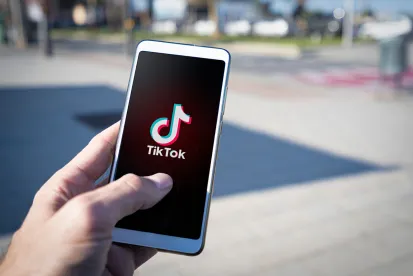On August 6, 2020, Trump issued two separate executive orders that will severely restrict TikTok and WeChat’s business in the United States. For weeks, the media has reported on Trump’s desire to “ban” TikTok with speculation about the legal authority to do so. We break down the impact of the Orders below.
The White House has been threatening for weeks to ban both apps in the interest of protecting “the national security, foreign policy, and economy of the United States.” According to the Orders issued Thursday, the data collection practices of both entities purportedly “threaten[] to allow the Chinese Communist Party access to Americans’ personal and proprietary information — potentially allowing China to track the locations of Federal employees and contractors, build dossiers of personal information for blackmail, and conduct corporate espionage.”
This is not a new threat. A variety of government actions in recent years have been aimed at mitigating the national security risks associated with foreign adversaries stealing sensitive data of U.S. persons. For example, in 2018, the Foreign Investment Risk Review Modernization Act (FIRRMA) was implemented to expand the authority of the Committee on Foreign Investment in the United States (CFIUS) to review and address national security concerns arising from foreign investment in U.S. companies, particularly where foreign parties can access the personal data of U.S. citizens. And CFIUS has not been hesitant about exercising this authority. Last year, CFIUS required the divestment of a Chinese investor’s stake in Grindr, the popular gay dating app, because of concerns that the Chinese investor would have access to U.S. citizens’ sensitive information which could be used for blackmail or other nefarious purposes. That action was in the face of Grindr’s impending IPO.
In May 2019, Trump took one step further, issuing Executive Order 13873 to address a “national emergency with respect to the information and communications technology and services supply chain.” That Order stated that foreign adversaries were taking advantage of vulnerabilities in American IT and communications services supply chain and described broad measures to address that threat. According to these new Orders, further action is necessary to address these threats. EO 13873 and the TikTok and WeChat Orders were all issued under the International Emergency Economic Powers Act (IEEPA), which provides the President broad authority to regulate transactions which threaten national security during a national emergency.
Order Highlights
Both Executive Orders provide the Secretary of Commerce broad authority to prohibit transactions involving the parent companies of TikTok and WeChat, with limitations on which transactions yet to be defined.
-
The TikTok EO prohibits “any transaction by any person, or with respect to any property, subject to the jurisdiction of the United States,” with ByteDance Ltd., TikTok’s parent company, “or its subsidiaries, in which any such company has any interest, as identified by the Secretary of Commerce”
-
The WeChat EO prohibits “any transaction that is related to WeChat by any person, or with respect to any property, subject to the jurisdiction of the United States, with Tencent Holdings Ltd., WeChat’s parent company “or any subsidiary of that entity, as identified by the Secretary of Commerce.”
-
Both Executive Orders will take effect 45 days after issuance of the order (September 20, 2020), by which time the Secretary of Commerce will have identified the transactions subject to the Orders.
Implications
Until the Secretary of Commerce identifies the scope of transactions prohibited by the Executive Orders, the ultimate ramifications of these Orders remain unclear. However, given what we do know, we have some initial thoughts on how these new prohibitions may play out. The following are some preliminary answers to the burning questions at the forefront of every American teenager’s (and business person’s) mind.
Q: Do these Orders ban the use of TikTok or WeChat in the United States?
A: While the Orders do not necessarily ban the use of TikTok or WeChat itself, the app (or any future software updates) may no longer be available for download in the Google or Apple app stores in the U.S., and U.S. companies may not be able to purchase advertising on the social media platform – effectively (if not explicitly) banning the apps from the United States.
Q: Will all transactions with ByteDance Ltd. and Tencent Holdings Ltd. (TikTok and WeChat’s parent companies, respectively) be prohibited?
A: Given the broad language in the Orders, it does appear that U.S. app stores, carriers, or internet service providers (ISPs) will likely not be able to continue carrying the services while TikTok and WeChat are owned by these Chinese entities. However, it is unlikely that the goal is to prohibit all transactions with these companies as a deterrent or punishment tool – which would essentially amount to designating them as Specially Designated Nationals (SDNs) – the Orders clearly contemplate some limitations to be imposed on the types of transactions subject to the Order by the Secretary of Commerce. Furthermore, the national security policy rationale for such restrictions will not be present in all transactions (i.e. if the concern is the ability of Chinese entities to access personal data of U.S. citizens in a manner that could be used against the interests of the United States, then presumably transactions in which ByteDance Ltd. and Tencent Holdings Ltd. do not have access to such data should be permissible.). So while we do not know exactly what the scope of prohibited transactions will be, it would appear that the goal is to restrict these entities’ access to U.S. data and any transactions that would facilitate or allow such access.
Q: What does “any property, subject to the jurisdiction of the United States” mean?
A: Normally, the idea behind such language is to limit the prohibited transactions to those with a clear nexus to the United States: any U.S. person or person within the United States, or involving property within the United States. It is unlikely that transactions conducted wholly outside the United States by non-U.S. entities would be impacted. From a policy perspective, it would make sense that the prohibitions be limited to transactions that would facilitate these Chinese entities getting access to U.S.-person data through the use of TikTok and WeChat.
Q: What about the reported sale of TikTok?
A: There is a chance the restrictions outlined in the TikTok EO will become moot. Reportedly, Microsoft is in talks with ByteDance to acquire TikTok’s business in the United States and a few other jurisdictions. If the scope of prohibited transactions are tailored to those involving access to U.S. person data and if a U.S. company can assure that U.S. user-data will be protected, then the national security concerns of continued use of the app would be mitigated. Unless and until such acquisition takes place, U.S. companies investing in TikTok or utilizing it for advertising such be prepared for the restrictions to take effect. At this time, there do not appear to be any U.S. buyers in the mix for WeChat.
Q: The WeChat EO prohibits any transaction that is “related to” WeChat…what does that mean?
A: The WeChat prohibition is more ambiguous and could have significantly wider impact on U.S. business interests. WeChat is widely used in the United States, particularly by people of Chinese descent, to carry out business transactions, including communicating with, and making mobile payments to, various service providers. The WeChat EO prohibits “any transaction that is related to WeChat” with Tencent Holdings Ltd., or any of its subsidiaries. Unlike TikTok, WeChat’s services extend beyond social media. While the language of the ban is vague and the prohibited transactions are yet to be determined, it appears likely that using WeChat for these communications and transactions may no longer be legal. It is also unclear if the WeChat prohibition will extend to other businesses tied to Tencent, WeChat’s parent company, including major gaming companies Epic Games (publisher of the popular “Fortnite”), Riot Games (“League of Legends”), and Activision Blizzard, all in which Tencent has substantial ownership interests. There has been some reporting that a White House official confirmed Tencent’s gaming interest are excluded from the Order as being unrelated to WeChat, but until the Secretary of Commerce specifies the prohibited transactions, the scope of the Order remains uncertain
Bottom Line
Until the Secretary of Commerce issues its list of transactions prohibited under these Executive Orders, the scope and effect of these Orders is conjectural. This Administration’s all-in posture towards China would suggest that the prohibitions could be broad and severe. U.S. companies utilizing WeChat or TikTok for business purposes or conducting business with the apps’ owners, should think carefully about ongoing and future transactions. Of course, there is an election right around the corner and a new Administration may bring significant change to related foreign, trade and technology policy. Thoughtful planning for a variety of scenarios will enable companies’ to respond appropriately as the restrictions on TikTok and WeChat are crystallized.





 />i
/>i

